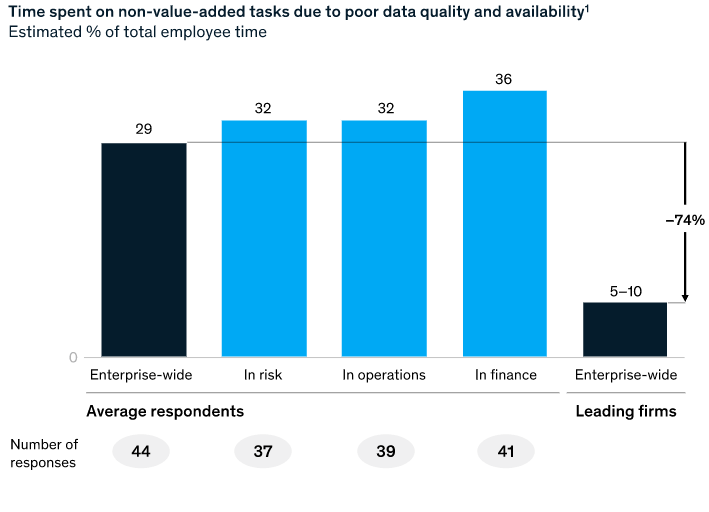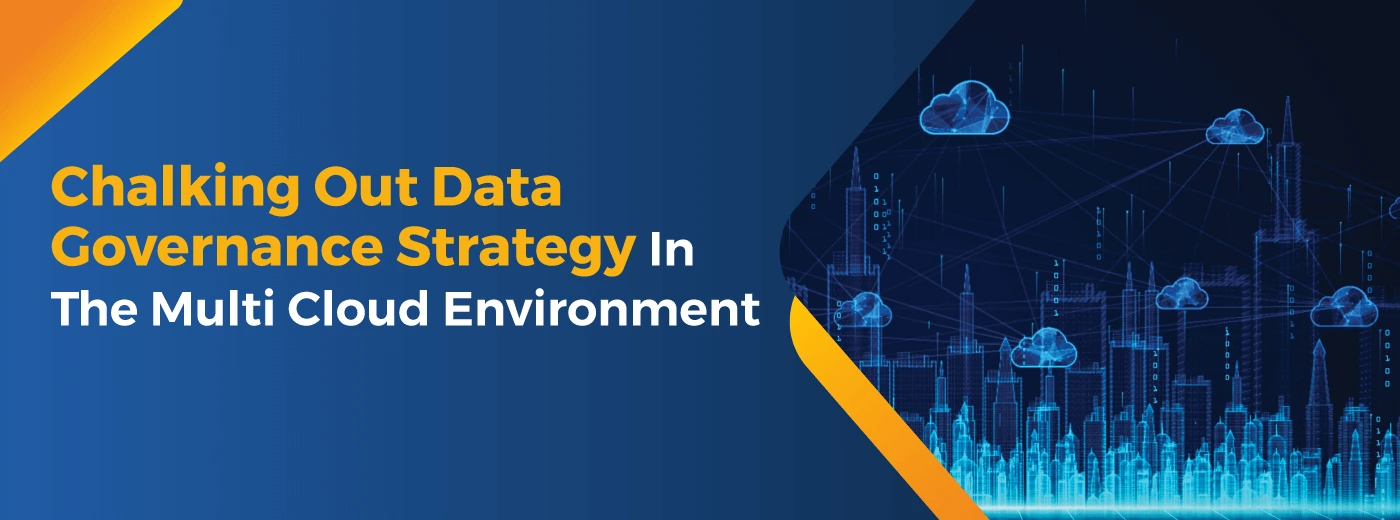For decades, many companies have expended significant time, money, and other resources to manage and govern data intended for business purposes. Data is one of the most potent elements modern businesses have at their disposal. Whether created by its customers, organization, or a third party, data can lead to meaningful insights that emphatically inform and shift business decisions when leveraged in an apt way.
However, when data is leveraged incorrectly, it can expose an organization to significant liabilities. The quantity of data generated has multiplied substantially over the past decade, increasing overlaps and multiple handling points. We have made significant advancements in areas such as self-service analytics, cloud computing, and data visualization, but we are not there yet when it comes to the data governance process.
In the current scenario, many organizations continue to enforce data governance through manual, outdated, and ad hoc tooling. Data teams spend days manually vetting reports, setting up custom rules, and comparing numbers side by side. As the amount of data sources increase and tech stacks become more complex, executives in every industry know the importance of data.
Without it, digital transformation is difficult to propel the organization past competitors. There is no analytics driving new sources of revenue. Even running the basic business is also not possible. Still, for data to fuel these initiatives, it must be readily available, relevant, and of high quality. Apt master data governance ensures that data has robust attributes, which allows it to create sheer value.
Challenges
The issue is that most governance programs today are inefficient. The problem frequently starts at the top, with a C-suite that does not realize the value-creation potential in enterprise data governance. In such scenarios, it becomes a set of policies and guidance relegated to a support function executed by IT and not widely followed—rendering the initiatives that data powers equally ineffective.
In other cases, organizations try to utilize technology to resolve the problem. While tech solutions like- data-governance and data lakes platforms can help, they aren't a panacea.
Without quality-assuring governance, organizations not only miss out on precious data-driven opportunities; they also waste resources. Cleanup and data processing can consume more than half of an analytics team's time, including highly paid data scientists, which frustrates employees and limits scalability. Indeed, the productivity of employees across the company can suffer. According to a survey, an average of 30 percent of their total enterprise time was spent on non-value-added tasks because of poor data quality and availability.

While it's challenging to attribute value to data governance directly, there are numerous examples of its critical indirect value. Leading organizations have eliminated millions of dollars in cost from their data ecosystems and enabled analytics and digital use cases worth millions or even billions of dollars.
Data governance is one of the top differences between organizations that capture this value and firms that don't. Additionally, firms that have underinvested in governance have exposed their organizations to real regulatory risk, which can be costly.
Therefore, a robust data governance framework is the solution to this widespread disorganization. As the volume, variety, and velocity of big data continue to increase, companies must realize that suitable data governance principles are a valuable and necessary part of their business information success story.
Manage enterprise data with confidence, assurance and ease of access with our data governance services.
Need For A Robust Data Governance Framework
Lack of data governance has often resulted in organizations' inability to derive any tangible advantages from data, despite investing heavily around the data value chains. A data governance framework refers to the process of building a model for managing enterprise data. A well-articulated data governance framework empowers an organization to define guidelines and rules on data management.
Companies can curate informed decisions about how to manage their data assets and ensure efficient utilization of trusted and properly governed data across the entire value chain. Adoption of a standard data governance framework also minimizes data management costs such as data storage, data processing, and operational expense.
For instance, one of a health care provider’s business drivers may be to ensure the privacy of patient-related data, requiring that data can be securely managed as it flows through the business to ensure compliance with relevant government and industry regulations. These requirements inform the provider’s data governance strategy, which becomes the basis of its data governance framework.
In a highly regulated business environment, it is challenging for organizations, especially in sectors like financial services, banking, healthcare, to manage their data-related risk and compliance hurdles. So, defining a data governance framework helps in risk management and ensures that the organization fulfils the growing demand for compliance with legal and regulatory requirements on data management.
A data governance framework comprises every part of an organization's data management process, down to individual technologies, databases, and data models. Now that we understand the importance of the data governance framework.
Let's Highlight Some Modern Enterprise Data Management Practices In The Cloud
As more companies begin their journey to the cloud, they need to plan how they will apply the best data management practices to make sure that the cloud-based, data-driven use cases are successful for end users and follow with data standards and enterprise governance. The good thing is that existing best practices work well in cloud environments, although adjustments are usually required. Here are several instances of data management best practices for cloud computing.
1. Manage Data Across Platforms, Including Cloud
This is true whether data exist on-premises, in the cloud, or both (as is common in today's multi-platform hybrid data architectures). It is also true whether data migrate to a cloud, originates there, migrates off a cloud, or in some combination of these. Application architectures and enterprise-scale data that involve clouds can be complex. But the matter of fact is - Organizations win with cloud data governance by extending or augmenting skills, existing teams, governance policies, business sponsorship, data management practices, and data integration infrastructure.
2. Deploy Substantial Data Management Infrastructure Before Starting Cloud Journey
In complex situations such as those just explained in the above point, you will need powerful architecture and tools for data integration and sometimes application integration, too. This infrastructure is needed to migrate and move data among platforms regularly. Having this infrastructure in place before starting your journey to cloud data governance as fitting it later is risky and disruptive. If organizations have the pre-existing infrastructure for data integration, they may simply extend it to cloud data governance platforms.
Organizations should also be open to additional tools built and optimized specifically for the kind of cloud and use case they need. As with on-premises data governance best practices, cloud best practices and tools required to address metadata, data quality, master data, and varying data speeds. Make sure that these are baked into your infrastructure and team skills. 3. Govern Data Holistically, Regardless Of The Location Or Data PlatformCompanies with a pre-existing master data governance program can most likely revise existing policies designed for on-premises data utilization and thereby ensure compliance for data that is moving in and out of clouds. Companies without such a program should leverage their journey to the cloud as a driver for initiating governance.
The prime view is that master data governance is a significant success factor for most data initiatives as it avoids the non-compliant use of data and aligns data management work with preferred business goals. When governance extends beyond compliance problems to data standards, it also elevates data's usability, quality, and trust. To get continuity and enterprise control across these desirable benefits, data governance should apply to all datasets, whether on-premises, in the cloud, or strewn across hybrid architectures.
Simplify data governance and realize the value of your enterprise data with our multi-cloud platforms.
Let’s Look At How A Data Governance Workshop Helps Organizations Redefine Their Objectives.
In the present scenario, data is driving the transformation imperatives for every CIO & CDO, but to be able to utilize it, control it, protect it and make it understood, a data governance program must be implemented to enable those efforts. The Data Governance Workshop shows organizations how to stand up a data governance program to manage their data as an organizational asset. Having the ability to exercise authority and decision-making over the data assets by improving the organization's data value and supporting an overall data strategy. The major impact of conducting the workshop is that -organization improves all areas of the business and aligns data needs across departments.
The primary objective of the workshop is to create a roadmap to define the right people, process and technology to build a Data Governance Center of Excellence. This engagement will leverage industry best practices and lessons learned from helping our clients meet their goals.
Workshop ObjectivesCreating a data governance program is not something you can do overnight. It involves establishing methods, processes and roles. Have a look at the goals.
- Identifying and aligning to your current data governance initiatives
- Define the value and vision of data governance
- Establish a data governance approach to fit your data needs and culture
- Define executive sponsorship and key technical and business leadership for the program
- Develop and deliver a near term data strategy roadmap allowing organizations to begin their data governance journey
After having a firm grip of your goals, challenges, and current environment, a detailed roadmap can be developed that provides recommendations based on your requirements and the environment of the organization.
- A client-centric, vendor-agnostic approach
- Development of clear sponsorship and data governance team members
- Clarification and documentation of a “right fit” approach to data governance
- Near term roadmap defined for data governance implementation
- Clear steps to begin the client-specific data governance journey
- Established partnership to drive long term success
How Can We Help?
We define a data governance workshop as a program of decision rights and accountabilities to appropriately treat data as an asset, including managing, leveraging, and protecting it accordingly. So, if you are struggling with data governance, know that you are not alone.
At the same time, there is plenty of room for improvement. At Polestar Solutions, we are excited to see which new approaches rise to meet this challenge. As a consulting firm, it is on us to drive home the importance of this topic, both in companies and the community at large. Get in touch today.



